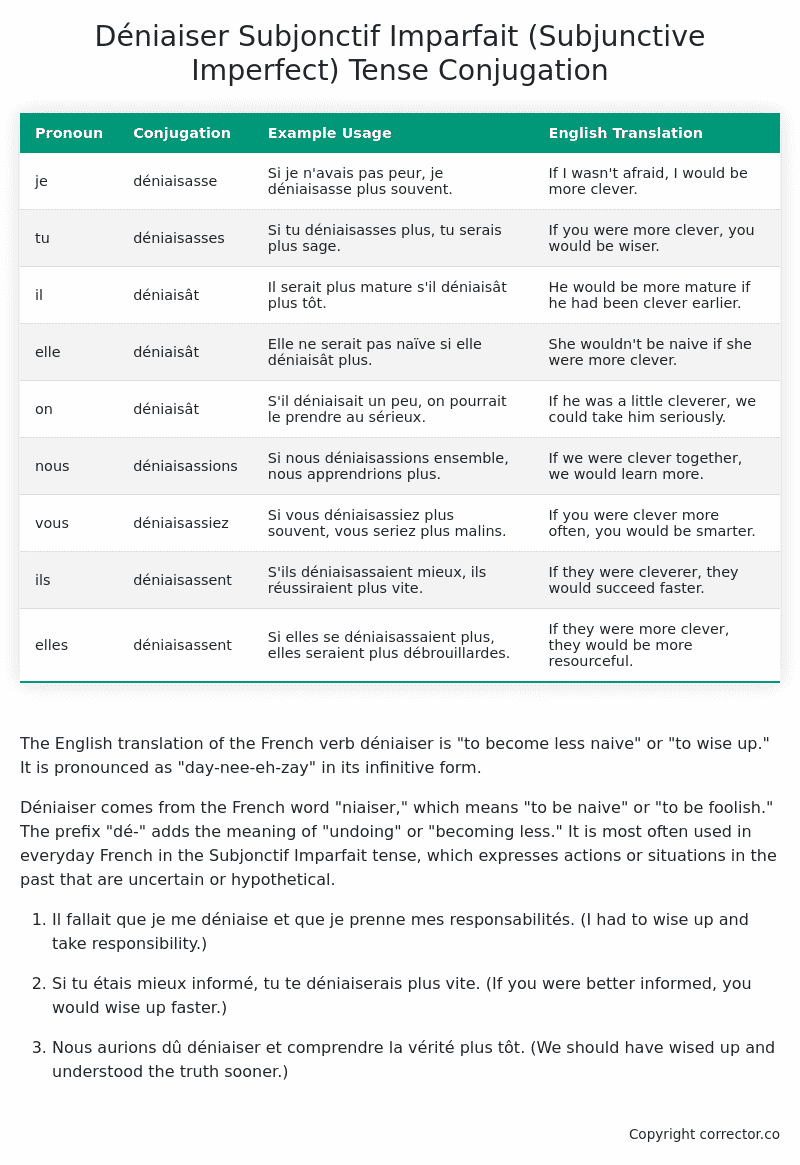Subjonctif Imparfait (Subjunctive Imperfect) Tense Conjugation of the French Verb déniaiser
Introduction to the verb déniaiser
The English translation of the French verb déniaiser is “to become less naive” or “to wise up.” It is pronounced as “day-nee-eh-zay” in its infinitive form.
Déniaiser comes from the French word “niaiser,” which means “to be naive” or “to be foolish.” The prefix “dé-” adds the meaning of “undoing” or “becoming less.” It is most often used in everyday French in the Subjonctif Imparfait tense, which expresses actions or situations in the past that are uncertain or hypothetical.
-
Il fallait que je me déniaise et que je prenne mes responsabilités. (I had to wise up and take responsibility.)
-
Si tu étais mieux informé, tu te déniaiserais plus vite. (If you were better informed, you would wise up faster.)
-
Nous aurions dû déniaiser et comprendre la vérité plus tôt. (We should have wised up and understood the truth sooner.)
Table of the Subjonctif Imparfait (Subjunctive Imperfect) Tense Conjugation of déniaiser
| Pronoun | Conjugation | Example Usage | English Translation |
|---|---|---|---|
| je | déniaisasse | Si je n’avais pas peur, je déniaisasse plus souvent. | If I wasn’t afraid, I would be more clever. |
| tu | déniaisasses | Si tu déniaisasses plus, tu serais plus sage. | If you were more clever, you would be wiser. |
| il | déniaisât | Il serait plus mature s’il déniaisât plus tôt. | He would be more mature if he had been clever earlier. |
| elle | déniaisât | Elle ne serait pas naïve si elle déniaisât plus. | She wouldn’t be naive if she were more clever. |
| on | déniaisât | S’il déniaisait un peu, on pourrait le prendre au sérieux. | If he was a little cleverer, we could take him seriously. |
| nous | déniaisassions | Si nous déniaisassions ensemble, nous apprendrions plus. | If we were clever together, we would learn more. |
| vous | déniaisassiez | Si vous déniaisassiez plus souvent, vous seriez plus malins. | If you were clever more often, you would be smarter. |
| ils | déniaisassent | S’ils déniaisassaient mieux, ils réussiraient plus vite. | If they were cleverer, they would succeed faster. |
| elles | déniaisassent | Si elles se déniaisassaient plus, elles seraient plus débrouillardes. | If they were more clever, they would be more resourceful. |
Other Conjugations for Déniaiser.
Le Present (Present Tense) Conjugation of the French Verb déniaiser
Imparfait (Imperfect) Tense Conjugation of the French Verb déniaiser
Passé Simple (Simple Past) Tense Conjugation of the French Verb déniaiser
Passé Composé (Present Perfect) Tense Conjugation of the French Verb déniaiser
Futur Simple (Simple Future) Tense Conjugation of the French Verb déniaiser
Futur Proche (Near Future) Tense Conjugation of the French Verb déniaiser
Plus-que-parfait (Pluperfect) Tense Conjugation of the French Verb déniaiser
Passé Antérieur (Past Anterior) Tense Conjugation of the French Verb déniaiser
Futur Antérieur (Future Anterior) Tense Conjugation of the French Verb déniaiser
Subjonctif Présent (Subjunctive Present) Tense Conjugation of the French Verb déniaiser
Subjonctif Passé (Subjunctive Past) Tense Conjugation of the French Verb déniaiser
Subjonctif Imparfait (Subjunctive Imperfect) Tense Conjugation of the French Verb déniaiser (this article)
Subjonctif Plus-que-parfait (Subjunctive Pluperfect) Tense Conjugation of the French Verb déniaiser
Conditionnel Présent (Conditional Present) Tense Conjugation of the French Verb déniaiser
Conditionnel Passé (Conditional Past) Tense Conjugation of the French Verb déniaiser
L’impératif Présent (Imperative Present) Tense Conjugation of the French Verb déniaiser
L’infinitif Présent (Infinitive Present) Tense Conjugation of the French Verb déniaiser
Struggling with French verbs or the language in general? Why not use our free French Grammar Checker – no registration required!
Get a FREE Download Study Sheet of this Conjugation 🔥
Simply right click the image below, click “save image” and get your free reference for the déniaiser Subjonctif Imparfait tense conjugation!

Déniaiser – About the French Subjonctif Imparfait (Subjunctive Imperfect) Tense
Formation
Common Everyday Usage Patterns
Interactions with Other Tenses
Subjonctif Présent
Indicatif Passé Composé
Conditional
Conditional Perfect
Summary
I hope you enjoyed this article on the verb déniaiser. Still in a learning mood? Check out another TOTALLY random French verb conjugation!


